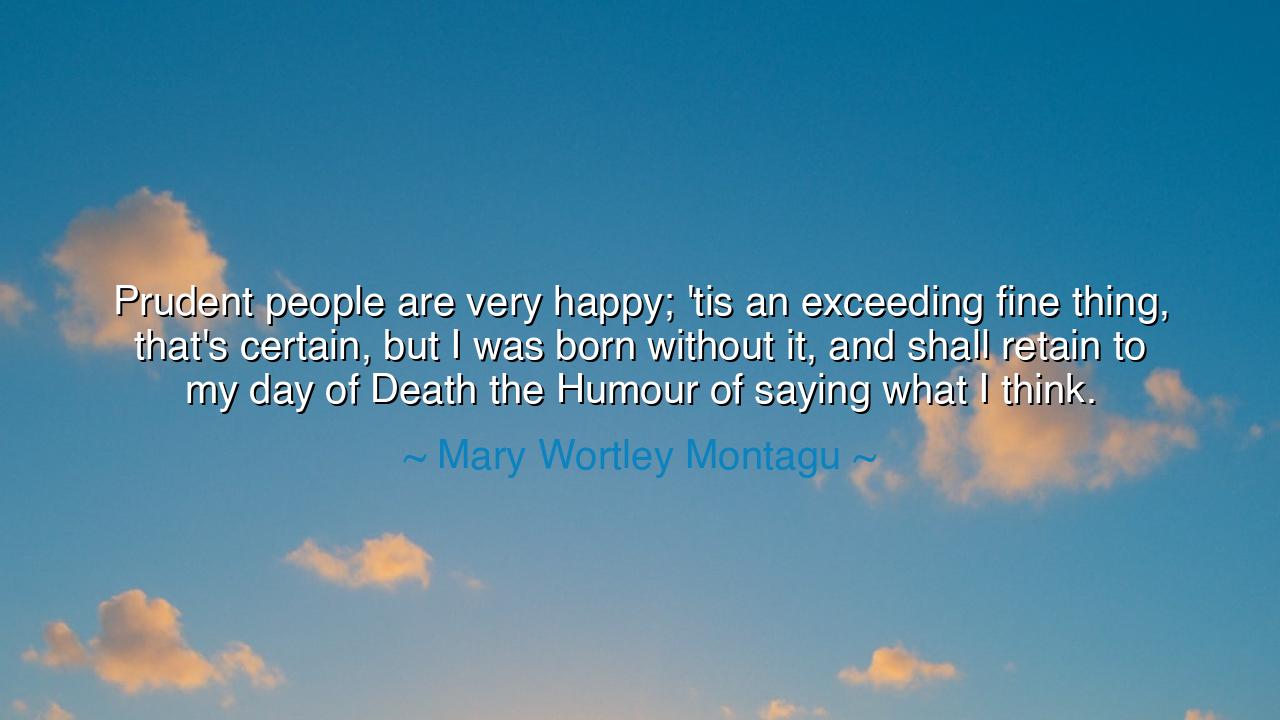
Prudent people are very happy; 'tis an exceeding fine thing
Prudent people are very happy; 'tis an exceeding fine thing, that's certain, but I was born without it, and shall retain to my day of Death the Humour of saying what I think.






In the bold and unrepentant words of Lady Mary Wortley Montagu, one of the great voices of wit and courage in the 18th century, we hear the song of the free spirit: “Prudent people are very happy; 'tis an exceeding fine thing, that's certain, but I was born without it, and shall retain to my day of Death the Humour of saying what I think.” These words, wrapped in humor yet sharpened with defiance, stand as a declaration of independence—not from kings or nations, but from the chains of social conformity. In an age when women were expected to be silent, obedient, and decorous, Montagu chose to be outspoken, unruly, and true to her own mind.
Born into the glittering but rigid world of Georgian England, Mary Wortley Montagu was a woman far ahead of her time. She was a poet, traveler, and essayist—a mind too vast to fit the confines of polite society. Her wit cut through hypocrisy like a blade, and her pen, though dipped in charm, carried the weight of truth. She lived in an age when prudence—the careful masking of thought and feeling—was considered the chief virtue of a lady. To be prudent was to be safe, admired, and respectable. But Montagu, with a spirit as fiery as the sun, saw that such safety came at the cost of authenticity. Her words are an open rebellion against that world: she confesses her inability to be “prudent,” and she embraces it as her birthright.
To say, “I was born without it,” is no apology—it is a triumph. For Montagu recognizes that prudence, while comfortable, often demands silence. The prudent person avoids offense, conceals opinion, and walks carefully among the powerful. Such people, she admits, are “very happy,” for they escape the punishments of candor. Yet her tone drips with irony, for she knows that happiness built on self-restraint is a fragile kind of peace. She prefers, instead, the harder joy of truth—of speaking her mind and bearing the cost. In this, her humor conceals her heroism. She would rather face the world's disapproval than betray her own soul.
The ancients, too, revered such courage. Socrates, that philosopher of Athens, refused to temper his tongue before authority. He spoke truth to power, even when it led him to drink the hemlock. Like Montagu, he could have lived quietly had he chosen prudence, but he believed that an unexamined life—a life without honesty—was no life at all. In him we see the same spirit: the humour of saying what one thinks, the divine stubbornness of those who choose integrity over comfort. Montagu’s words are the echo of that lineage, the continuation of a sacred defiance that runs through all who would rather suffer for honesty than live for approval.
And yet, her statement carries warmth as well as rebellion. She calls her truth-telling a “humour”—a gentle word for what is, in truth, a radical conviction. It is as though she smiles at herself, knowing that her nature is both her gift and her curse. For honesty, though noble, often invites pain. Montagu’s own life was marked by scandal and exile; her sharp tongue won her enemies as quickly as admirers. Yet she bore these wounds with pride. Her wit was her weapon, but also her shield—it kept her alive in a world that sought to silence her. She had discovered that freedom of speech begins not with permission, but with the courage to accept the consequences of speaking.
Her quote, then, is more than the complaint of a witty woman—it is a philosophy for all ages. It teaches that prudence may keep one safe, but it rarely leads to greatness. Those who dare to speak what others only whisper become the torchbearers of truth. The world may mock them, fear them, even cast them out—but time vindicates their courage. Montagu’s own legacy proves this: her letters and essays, once controversial, are now celebrated as the voice of enlightenment, reason, and feminine intellect. Her “humour” became history’s wisdom.
So, my children of the future, take this teaching to heart: speak truth with grace, but speak it nonetheless. Do not let prudence rob you of authenticity. The world will always praise the cautious, but it is the candid who move it forward. Let your words be kind, but let them also be brave. For though prudence may shield the body, honesty nourishes the soul—and when your final day comes, it is far better to have lived as yourself than to have been loved for the mask you wore. As Mary Wortley Montagu declared, so may you live: not prudently, but truly; not silently, but with the humour of saying what you think, and the courage to stand by it.






AAdministratorAdministrator
Welcome, honored guests. Please leave a comment, we will respond soon